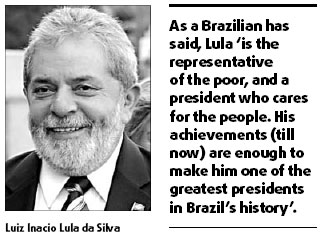Courage of conviction makes him so different
From a shoeshine boy with only five years' schooling to the president of Brazil, the life of Luiz Inacio Lula da Silva reads like a fairy tale.
He has defied conventions and many a popular theory. For example, he won the presidential election in October 2002 in his fourth attempt, rubbishing the "either you win at the third attempt, or you quit" theory. He is the first Brazilian president who comes from the working class.
A landslide victory in October 2006 saw him retain his office, and his effective governance made the Newsweek declare him the 18th most influential and powerful person in the world. In the list of 50 people, he scored over Warren Buffet, Bill Gates, Dominique Strauss-Kahn and Steve Jobbs. The Newsweek said Lula had built Brazil into one of the most economically stable emerging markets. And at the G20 Summit in London in April, Barack Obama called him one of the most popular politicians in the world.

In December 2008, an opinion poll by Datafolha, a trusted Brazilian poll agency, showed 70 percent of the people rated Lula's policies as "very good" or "good". That made him the president with the highest approval rating in Brazil's history.
On the political front, despite being a former radical leftist, Lula unified about 10 parties - from the left as well as the right - after being re-elected to form the largest ruling coalition in Brazil's history. His coalition strategy has focused on maintaining administrative stability and consistency in policies.
Brazil's economy has grown at an annual average of 4 percent in the last six years, 1 percent higher than that of his predecessor Fernando Cardoso's eight-year rule. The growth rate in 2004 was 5.7 percent, the highest since 1994.
Lula's policies have facilitated the fast and stable economic boom that has helped Brazil resume its position among the 10 largest economies in the world. The country's per capita GDP was $2,800 when he assumed power in 2002, but by last year it had crossed $7,000.
His tenure has seen an improvement in all macro-economic indices of the country. Inflation has been curbed, foreign debts are at a historic low, foreign direct investment has surged, and foreign exchange reserves have jumped from $37 billion in 2002 to a staggering $200 billion last year.
In the first half of 2008, credit rating institutes such as Standard & Poor's, DBRS and Fitch raised Brazil's rating to "investment grade" because its macro-economic situation had "improved fundamentally", and it had fairly optimistic medium-term prospects of economic growth.
Lula has achieved a lot on the social front, too. During his campaign in 2002, he made "helping the poor have three meals a day" his biggest mission. Since assuming office, his administration has implemented a series of social projects, topped by "Fome Zero" (Zero Hunger) and "Bolsa Familia" (Family Stipend), which have achieved brilliant results.
The income of the poor has grown by 22 percent in the past five years compared with 4.9 percent growth for the rich. The 1991-2001 decade saw 3.2 million jobs being created, but during Lula's first four years alone, the country offered 4.65 million new jobs. The minimum wage has surged from 200 real a month in 2003 to 465 real earlier this year, and the income gaps between men and women and among different ethnic groups have narrowed.
The country's demography has changed, too, with the proportion of the middle class increasing from 42 percent in 2005 to 52 percent now. The number of the poor shrunk by 27.7 percent during Lula's first tenure, more than what Cardoso could achieve during his two tenures.
Lula has tried to extend the "Fome Zero" project to other countries, too, making him a leader in the global anti-poverty movement.
He has used "presidential diplomacy", "trade diplomacy", "cultural diplomacy", "generous diplomacy" and "ethanol diplomacy" to improve Brazil's foreign relations. He has presided over the diversification of foreign trade, bolstered the country's independent economic development, raised the level of Brazil's leadership in Latin America, and promoted the regional integration of the continent.
By actively participating in UN reforms, the Doha round of WTO talks and other global forums, Brazil has strengthened its position on the global stage. Driven by his active diplomatic strategy, the country has enhanced its influence in the international community.
Lula was lucky to inherit the basic framework of many policies from his predecessor Cardoso. But he has succeeded in his efforts because he always tries to reach his goals and honor the promises he made during his election campaigns.
His political and financial farsightedness have helped Brazil weather the global financial crisis without much harm. In fact, the Organization of Economic Cooperation and Development has described Brazil as a "model country for economic stability".
As a Brazilian has said, Lula "is the representative of the poor, and a president who cares for the people. His achievements (till now) are enough to make him one of the greatest presidents in Brazil's history. The Brazilian people will remember him forever."
The author is a researcher with the Institute of Latin American Studies, the Chinese Academy of Social Sciences.
(China Daily 05/26/2009 page9)














